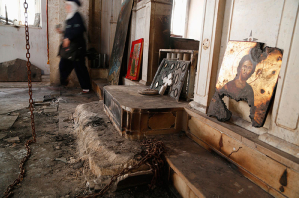
Activists have warned that thanks to increasingly brutal persecutions of Christians, most notoriously under ISIS, Christianity may disappear entirely from the Middle East if trends continued.
According to Kareem Shaheen of The Guardian, the kidnappings of 150 Assyrian Christians in Syria by ISIS militants are the latest blow to the ancient Christian presence in the region. The Syrian Observatory for Human Rights (SOHR) reported that four Christians were killed when ISIS conducted the kidnappings.
"This is another episode in the targeting to the Christians of the east," Habib Afram, president of the Syriac League in Lebanon, said. "We are witnessing the end of the Christian presence in the east."
Shaheen reported that the rights monitoring group, through its sources on the ground, overheard ISIS militants used the term "crusaders" to describe the Christian hostages. This was the same term used by ISIS when they beheaded 21 Egyptian Coptic Christians in Libya.
Mardean Issac, an Assyrian writer and member of the organization A Demand for Action, told The Guardian that Assyrian Christians have historic ties to the area that ISIS now controls.
"The Assyrian people are not merely Christians, but indigenous inhabitants of the Middle East," Issac said. "After the Iraq war of 2003, and since the Syrian crisis began, the persecution unleashed on them - including extortion, kidnappings, murder, the ethnic cleansing of entire swaths of Baghdad, the Nineveh plains, and now much of north-east Syria, has been so vast that their very existence in their ancestral homelands is in grave peril."
Issac added that "we are watching a living history and all that comprises [it] disappear."
According to Shaheen, ISIS has singled out both Christians and minorities for persecution. In addition to Assyrian Christians, the terror group's march across Syria and Iraq have forced out Chaldean Christians, Yazidis and other minorities from areas that used to co-exist with each other "for nearly 2,000 years."
"They are not part of the struggle," Afram said, noting that Christians in the area did not join any military operations. "We do not understand this targeting of Christians."
Despite the persecution exercised by ISIS and other extremist groups, an opinion from the Right Reverend Dr. Christopher Cocksworth of the Daily Express stated that ISIS, through its persecution of Christians, is ignorant of history.
"The [ISIS] perversion of theology is matched only by their ignorance of history," Cocksworth wrote. "Its militants accuse their Coptic victims of being Crusaders. In fact, the Coptic Church opposed the Crusades."
Cocksworth reported that in Iraq, the Christian community dropped from 1.5 million in 2003 to around 200,000 in 2013.
"Christians in Iraq have come to the absolute conviction that their country is not theirs," Iraqi Chaldean Archbishop Bashar Warda said.
Cocksworth highlighted the contributions that Christians in the Middle East have made to the region until recent times.
"Like their churches, Middle Eastern Christians themselves have always been well established in their home countries," Cocksworth said. "They speak Arabic, attend university and have careers. They make a real contribution to their nations."
However, Afram told The Guardian that he condemned the "frightening and shocking Arab silence" at the persecution aimed at Christians in the region. He argued that air strikes alone would not put an end to violence against minorities in the Middle East.
"Coexistence needs two sides," Afram said.
Cocksworth argued that it is up to all Christians to keep supporting the importance of religious freedom despite the persecution directed against them in the Middle East.
"It's up to us to defend tolerance at home by word, example and hospitality, so we may campaign for it abroad," Cocksworth wrote. "It's up to us to promote a more hopeful narrative than the extremist obsession with death and violence. We must provide the alternative to their disregard for human life and their use of faith as a smokescreen."
Cocksworth defended his argument by citing Romans 12:21, which states "Do not be overcome by evil, but overcome evil with good."







